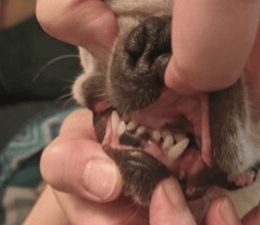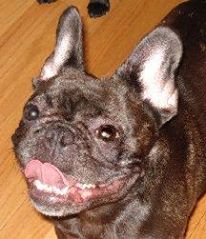Should you brush your dog’s teeth?
Well, of course you should brush your dog’s teeth. And, equally “of course” most people don’t.
There is a school of thought that says it’s not necessary, especially among people who give their dogs raw, natural bones to chew on. Those people say the “gnawing” action cleans the dog’s teeth just fine and no further brushing is necessary. If it works for you and your dog, you may not need to brush your dog’s teeth.
An ounce of prevention
In our experience, dogs are a lot like people. Some go their whole lives with no dental issues. Others are constantly at the dentist’s office for something.
It’s a fact that small dogs are more prone to dental issues than big dogs. We don’t know why that’s the case, but we do know we have to deal with it. And our answer has always been to brush our dogs’ teeth at least once once every week.
Veterinary advice
Veterinarians actually advise brushing your dog’s teeth a few times every week. If your household is anything like ours, that’s just not going to happen. Sorry, Dr. Jan, but we just can’t.
Simply put, we’re afraid every time our dogs have to undergo anesthesia. If we can avoid it by taking five minutes every week to tend to their teeth – we’re going to do it as the lesser of evils. It also gives us a chance to take a look at what’s going on in their mouths, if there are any sore spots, or growths, just take a look and see that everything’s okay.
Do they like it? No. Not one of them enjoys it. Do they let us? Yes, because we’ve established the routine since the day we brought each one home. And we’ve developed a method that keeps it short, manageable, and less unpleasant for everyone.
Dogs love routine
It’s true that dogs like knowing what to expect. They like having schedules and routines. Like when the clocks change from Daylight Savings Time – you know your dog is going to get you up an hour earlier. The “Spring Ahead” part is fine – dogs will never object to getting fed an hour earlier. But the “Fall Back” is a pain – we never get the extra hour of sleep we were anticipating. Because the dogs’ internal clocks are telling them it’s time to get up.
So on Sunday mornings, we lay out our supplies for our weekly “ablutions.” And each dog, in turn, gets his nails trimmed, teeth brushed, face washed, and ears cleaned. They know what’s coming, so they don’t mind too much.
Favorite flavor
Over the years we’ve tried all kinds of different dog toothpastes with all kinds of flavors; beef, peanut butter, liver (that one was not pleasant for anyone!), even vanilla. The dogs hated all of them. And as we read ingredient lists that were getting longer and less pronounceable, we started making our own toothpaste. Our great-grandparents would recognize our recipe – just coconut oil, baking soda, and peppermint oil. It’s by far our dogs’ favorite toothpaste, and ours, too!
The equipment list is short – gauze (or a washcloth), toothpaste, and water. That’s it. We just dampen the cloth, grab a little paste from the jar, and rub it on our dogs’ teeth. Brushing your dog’s teeth doesn’t need to take long or be complicated. It just has to get done.
Positive results
Since we started the tooth-brushing routine over a decade ago, not one of our dogs has required a professional tooth cleaning. No anesthesia, no added expenses. And our dogs have retained all of their teeth into their senior years.

Of course every dog is different. Just like people, dogs’ mouth chemistry differs among individuals. Some are more prone to plaque buildup than others. Just among our own dogs, their saliva varies. Booker (Boston Terrier) has the most slimy, thick spit you’ve ever experienced. Simon, also a Boston, has much more rinse-able saliva. Simon also has retained baby teeth at this point, which we keep an eye on. Our weekly exam lets us know if anything’s changing.
Keep it simple
If you’re tempted to start brushing your dog’s teeth, as with all dog training, don’t go for a home run the first time at bat. Show the dog the cloth. Let him/her sniff the toothpaste. Even lick it if she wants to. Introduce everything gradually and, chances are, your dog will come to tolerate, if not enjoy, the attention.









